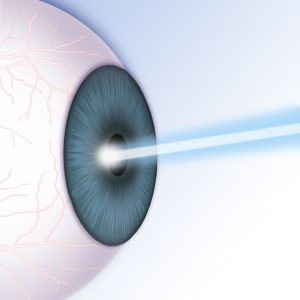LASIK and Teens: What Young Patients Should Know
November 1, 2016Laser Eye Surgery’s Best Kept Secret: PRK Success Rates
December 6, 2016If you have blurry vision due to nearsightedness, farsightedness, or astigmatism, you have probably grown frustrated with your daily dependence on eyeglasses and contact lenses. While effective, these visual aids can be a hassle, leaving many patients wishing they could have permanently clear vision. Of course, this desire could be a reality for patients if they choose to undergo laser vision correction procedures such as LASIK or PRK.
LASIK and PRK treat the actual cause of refractive errors: an irregularly shaped cornea. By reshaping the cornea during PRK or LASIK surgery, Dr. Kenneth S. Miller can help patients achieve clear vision without the need for glasses or contacts. But how do you know which procedure is right for you? To learn more about LASIK vs. PRK, read on, and then contact our West Orange, NJ practice, Laser Vision Correction Center of New Jersey.
LASIK Surgery
The majority of patients that come to our practice to undergo laser vision correction surgery for their refractive errors will undergo LASIK surgery. LASIK and PRK are similar procedures that offer comparable results. However, LASIK is associated with a shorter recovery period and less severe side effects, so LASIK surgery is the preferred option when patients are considered good candidates for the procedure.
The LASIK Procedure
The difference between LASIK and PRK is the manner in which the underlying corneal tissue, which will be reshaped with an excimer laser, is accessed. During LASIK surgery, precise incisions are made in the outermost layer of the cornea, the epithelium. These incisions create a hinged flap, which can be flipped open to reveal the cornea’s stromal layers. The stromal layers are then reshaped with the excimer laser to achieve the ideal corneal curvature.
To complete the surgery, the epithelial flap is closed, allowing the incisions to heal on their own. The use of the flap reduces healing time, minimizes pain, and results in clear vision sooner. For these reasons, LASIK is recommended to patients when they are good candidates for the procedure.
PRK Surgery
PRK surgery is recommended to patients that want to undergo laser vision correction but are not considered good candidates for LASIK. In order for patients to undergo LASIK, they must have a sufficiently thick cornea to support the creation of the corneal flap. For patients with thin corneas or certain corneal degenerations, PRK surgery may be recommended in place of LASIK.
The PRK Procedure
During PRK surgery, the epithelial layer of the cornea is removed, providing access to the underlying corneal layer. The stroma is then reshaped with an excimer laser. To complete surgery, special contact lenses are placed in the eyes to encourage healing of the epithelium. Over the next few weeks, the epithelial layer will regenerate.
Because the epithelial layer is removed, PRK does result in a longer healing period and increased discomfort. However, the results of PRK surgery are comparable to LASIK. Many patients no longer require glasses or contact lenses to see clearly after PRK surgery.
To find out if LASIK or PRK is right for you, contact Laser Vision Correction Center of New Jersey today.



